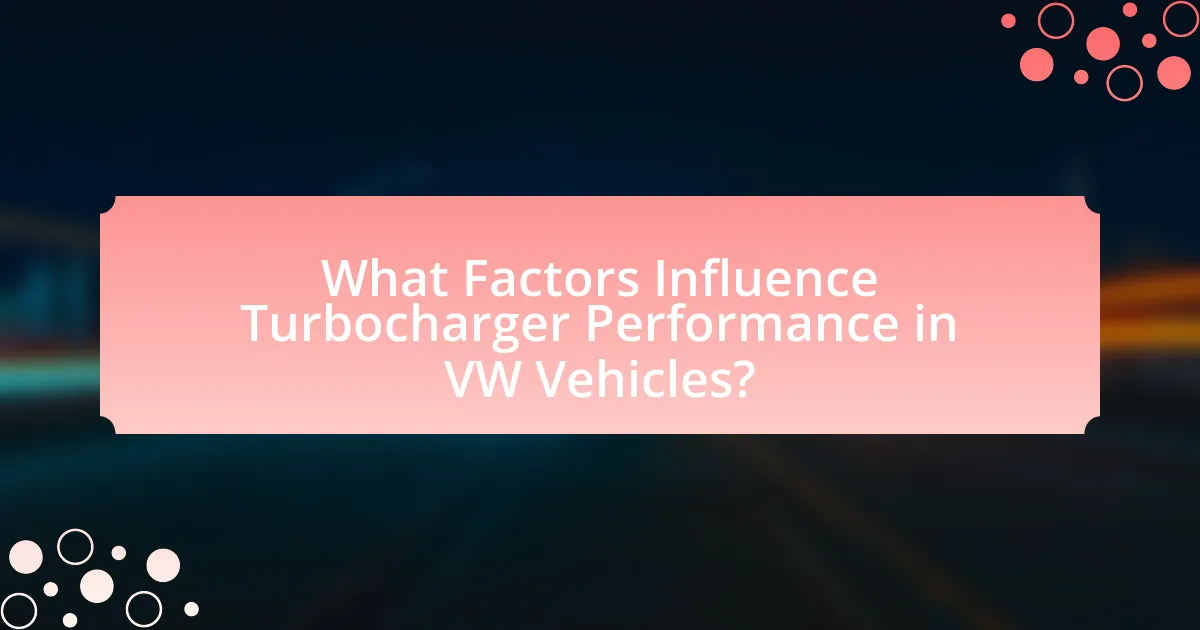Choosing the right turbocharger for your VW involves several critical considerations, including engine compatibility, desired power output, and driving style. The article outlines how engine size and configuration influence turbocharger selection, detailing the various types available, such as single, twin-scroll, and variable geometry turbochargers. It emphasizes the importance of matching turbocharger specifications with the vehicle’s needs to optimize performance and reliability, while also addressing maintenance practices and troubleshooting tips to ensure longevity. Additionally, the article provides guidance on leveraging online resources and consulting with specialists for informed decision-making in turbocharger selection.

What Should You Consider When Choosing a Turbocharger for Your VW?
When choosing a turbocharger for your VW, consider the engine compatibility, desired power output, and the type of driving you intend to do. Engine compatibility ensures that the turbocharger fits your specific VW model and engine type, which is crucial for optimal performance. Desired power output helps in selecting a turbocharger that can meet your performance goals without causing engine strain. Additionally, the type of driving—whether street, track, or off-road—affects the turbocharger’s size and characteristics needed for efficiency and responsiveness. These factors are essential for achieving the best performance and reliability from your VW’s turbocharged system.
How does the engine size affect turbocharger selection?
Engine size significantly influences turbocharger selection, as larger engines typically require larger turbochargers to effectively boost performance. The reason for this is that a larger engine displaces more air and fuel, necessitating a turbocharger that can provide sufficient airflow to match the engine’s capacity. For instance, a 2.0-liter engine may be paired with a smaller turbocharger to optimize spool time and efficiency, while a 3.0-liter engine would benefit from a larger turbocharger to ensure adequate power output and performance at higher RPMs. This relationship is crucial because selecting an improperly sized turbocharger can lead to issues such as turbo lag or insufficient power delivery, ultimately affecting the vehicle’s overall performance.
What are the implications of engine displacement on turbocharger performance?
Engine displacement significantly impacts turbocharger performance by influencing the amount of air and fuel mixture that can be drawn into the engine. Larger engine displacements typically allow for greater airflow, which can enhance the turbocharger’s ability to produce boost pressure, leading to improved power output. For instance, a 2.0-liter engine can generate more power with a turbocharger compared to a 1.0-liter engine due to the increased volume of air available for combustion. Additionally, the efficiency of the turbocharger can be optimized for specific engine displacements, as manufacturers often design turbochargers to match the airflow characteristics of particular engine sizes, ensuring better performance and responsiveness.
How does engine configuration influence turbocharger choice?
Engine configuration significantly influences turbocharger choice by determining the engine’s displacement, layout, and intended performance characteristics. For instance, a V6 engine may require a different turbocharger size and type compared to a four-cylinder engine due to differences in airflow requirements and power output. Additionally, configurations such as inline or V-type engines affect the placement and number of turbochargers needed; a twin-turbo setup might be more suitable for a V8 engine to optimize power delivery across the RPM range. The specific needs of the engine, including boost pressure and response time, dictate the selection of a turbocharger that can efficiently meet those demands, ensuring optimal performance and reliability.
What are the different types of turbochargers available for VW vehicles?
The different types of turbochargers available for VW vehicles include single turbochargers, twin-scroll turbochargers, and sequential turbochargers. Single turbochargers are the most common, providing a balance of performance and efficiency. Twin-scroll turbochargers utilize two separate exhaust paths to improve response and reduce turbo lag, enhancing performance at various RPMs. Sequential turbochargers employ two turbos of different sizes, optimizing power delivery across a wider range of engine speeds. These types are designed to cater to various performance needs and engine configurations in VW vehicles.
What is the difference between single and twin-scroll turbochargers?
Single-scroll turbochargers utilize one exhaust gas inlet to drive the turbine, while twin-scroll turbochargers feature two separate inlets that allow for better exhaust gas management. The twin-scroll design improves efficiency by reducing turbo lag and enhancing power delivery across a broader RPM range, as it separates the exhaust pulses from different cylinders, allowing for more effective scavenging. This design leads to quicker spool-up times and increased overall performance, particularly in engines with uneven firing orders.
How do variable geometry turbochargers work and when should they be used?
Variable geometry turbochargers (VGTs) work by adjusting the angle of the turbine vanes to optimize airflow and boost pressure across a range of engine speeds. This mechanism allows for improved efficiency and performance, particularly in smaller engines that require quick spool-up and reduced turbo lag. VGTs should be used in applications where a wide range of operating conditions is expected, such as in diesel engines or performance vehicles, as they enhance responsiveness and power delivery while maintaining fuel efficiency.
Why is it important to match turbocharger specifications with your VW’s needs?
Matching turbocharger specifications with your VW’s needs is crucial for optimal engine performance and efficiency. When the specifications align with the vehicle’s requirements, it ensures that the turbocharger can deliver the appropriate boost pressure and airflow, which enhances power output and fuel efficiency. For instance, a turbocharger designed for a specific engine size and type will maximize the engine’s potential without causing excessive strain or damage. Mismatched specifications can lead to issues such as lag, overheating, or even engine failure, as the turbo may not operate within its intended parameters. Therefore, selecting a turbocharger that fits the specific needs of your VW is essential for maintaining reliability and achieving the desired performance outcomes.
What role does boost pressure play in turbocharger selection?
Boost pressure is a critical factor in turbocharger selection as it directly influences engine performance and efficiency. Higher boost pressure increases the amount of air entering the engine, allowing for more fuel to be burned and resulting in greater power output. For instance, a turbocharger designed to provide a boost pressure of 15 psi can significantly enhance horsepower compared to a naturally aspirated engine. Selecting a turbocharger that matches the desired boost pressure is essential for achieving optimal performance, as mismatched boost levels can lead to engine knock or excessive exhaust temperatures, potentially damaging the engine. Therefore, understanding the required boost pressure for specific performance goals is vital in the turbocharger selection process.
How do flow rates and efficiency ratings impact performance?
Flow rates and efficiency ratings directly influence the performance of a turbocharger by determining the volume of air and fuel that can be effectively compressed and delivered to the engine. Higher flow rates enable the engine to intake more air, which can lead to increased power output, while efficiency ratings indicate how effectively the turbocharger converts exhaust energy into usable power. For instance, a turbocharger with a high efficiency rating can produce more boost with less energy loss, enhancing overall engine performance and responsiveness. Studies show that optimizing flow rates and efficiency can lead to performance gains of 10-20% in turbocharged engines, demonstrating their critical role in maximizing engine output and efficiency.

What Factors Influence Turbocharger Performance in VW Vehicles?
Turbocharger performance in VW vehicles is influenced by several key factors, including engine size, boost pressure, exhaust flow, and intercooler efficiency. Engine size determines the volume of air that can be compressed, directly affecting power output. Boost pressure, which is the amount of air forced into the engine, enhances performance but must be balanced to avoid engine damage. Exhaust flow is critical, as a well-designed exhaust system reduces back pressure, allowing the turbocharger to spool more efficiently. Lastly, intercooler efficiency plays a role in cooling the compressed air, which increases density and improves combustion efficiency. These factors collectively determine the effectiveness and reliability of the turbocharger in VW vehicles.
How does the choice of materials affect turbocharger durability?
The choice of materials significantly affects turbocharger durability by influencing its resistance to thermal stress, corrosion, and mechanical wear. High-performance turbochargers often utilize materials like Inconel for turbine components and aluminum or high-grade steel for housings, which can withstand extreme temperatures and pressures. For instance, Inconel can endure temperatures exceeding 1,000 degrees Celsius, reducing the risk of failure due to thermal fatigue. Additionally, the use of advanced coatings can enhance corrosion resistance, further extending the lifespan of the turbocharger. Therefore, selecting appropriate materials is crucial for ensuring the reliability and longevity of turbochargers in automotive applications.
What materials are commonly used in turbocharger construction?
Turbochargers are commonly constructed using materials such as aluminum, cast iron, and stainless steel. Aluminum is often used for the compressor housing due to its lightweight and good thermal conductivity, while cast iron is typically utilized for the turbine housing because of its ability to withstand high temperatures and pressures. Stainless steel is frequently employed for the turbine wheel and other components due to its corrosion resistance and strength at elevated temperatures. These material choices ensure durability and efficiency in turbocharger performance.
How do these materials impact heat resistance and longevity?
Materials used in turbocharger construction significantly influence heat resistance and longevity. High-performance turbochargers often utilize materials like Inconel and stainless steel, which can withstand elevated temperatures and resist thermal fatigue. For instance, Inconel, a nickel-chromium superalloy, maintains its strength at high temperatures, allowing for prolonged operational life under extreme conditions. Conversely, lower-grade materials may degrade faster, leading to reduced efficiency and a shorter lifespan. Research indicates that turbochargers made from high-quality alloys can operate effectively at temperatures exceeding 1,000 degrees Fahrenheit, thereby enhancing both heat resistance and overall durability.
What tuning considerations should be made when installing a turbocharger?
When installing a turbocharger, tuning considerations include adjusting the air-fuel ratio, ignition timing, and boost levels to ensure optimal engine performance and reliability. Properly tuning the air-fuel ratio is crucial because a lean mixture can lead to engine knock, while a rich mixture can cause incomplete combustion and increased emissions. Adjusting ignition timing is necessary to prevent pre-ignition and to maximize power output, as turbocharged engines often require different timing settings compared to naturally aspirated engines. Additionally, setting appropriate boost levels is essential to avoid over-boosting, which can damage engine components. These tuning adjustments are supported by performance data indicating that proper tuning can enhance horsepower and torque while maintaining engine longevity.
How does engine management software play a role in turbocharger performance?
Engine management software optimizes turbocharger performance by controlling air-fuel ratios, boost levels, and ignition timing. This software adjusts parameters in real-time based on engine conditions, ensuring that the turbocharger operates efficiently and effectively. For instance, precise tuning can prevent turbo lag and enhance throttle response, leading to improved acceleration and overall engine performance. Additionally, advanced engine management systems can monitor exhaust gas temperatures and adjust boost pressure to prevent engine knock, thereby safeguarding the engine while maximizing power output.
What are the benefits of custom tuning after turbocharger installation?
Custom tuning after turbocharger installation enhances engine performance, efficiency, and reliability. This process allows for the optimization of air-fuel ratios, ignition timing, and boost levels tailored to the specific turbocharger and engine combination. By adjusting these parameters, custom tuning can significantly increase horsepower and torque, often resulting in gains of 20-30% or more, depending on the setup. Additionally, it helps prevent engine knock and ensures that the engine operates within safe limits, thereby extending its lifespan. Studies have shown that vehicles with custom tuning post-turbo installation experience improved throttle response and overall drivability, making it a crucial step for maximizing the benefits of a turbocharger.
Why is proper installation crucial for turbocharger efficiency?
Proper installation is crucial for turbocharger efficiency because it ensures optimal airflow and minimizes potential leaks. When a turbocharger is installed correctly, it allows for precise alignment and secure connections, which are essential for maintaining the intended boost pressure and performance. Misalignment or improper sealing can lead to exhaust leaks, reduced boost, and increased turbo lag, ultimately compromising engine performance. Studies indicate that a well-installed turbocharger can improve engine efficiency by up to 20%, highlighting the importance of installation quality in achieving desired performance outcomes.
What common installation mistakes should be avoided?
Common installation mistakes to avoid when choosing a turbocharger for your VW include improper alignment of the turbocharger, neglecting to use new gaskets and seals, and failing to ensure adequate oil supply and drainage. Improper alignment can lead to excessive wear and potential failure of the turbocharger, while using old gaskets can cause leaks and reduce performance. Additionally, inadequate oil supply can result in turbocharger damage due to insufficient lubrication, which is critical for its operation. These mistakes can significantly impact the performance and longevity of the turbocharger, making it essential to address them during installation.
How can proper alignment and sealing enhance turbocharger performance?
Proper alignment and sealing significantly enhance turbocharger performance by ensuring optimal airflow and reducing the risk of leaks. When a turbocharger is correctly aligned, it minimizes mechanical stress and wear on components, which leads to improved efficiency and longevity. Additionally, effective sealing prevents exhaust gases from escaping, allowing for maximum energy transfer to the turbine. Studies indicate that even minor misalignments can lead to a decrease in performance by up to 10%, highlighting the importance of precision in installation. Therefore, maintaining proper alignment and sealing is crucial for achieving peak turbocharger functionality and reliability.
What Are the Best Practices for Maintaining Your VW’s Turbocharger?
To maintain your VW’s turbocharger effectively, regularly check and change the engine oil, as clean oil ensures proper lubrication and cooling of the turbo components. Additionally, allow the engine to idle for a few minutes before shutting it off after driving, which helps prevent oil coking in the turbocharger. Inspect the air intake and exhaust systems for leaks or blockages, as these can impact turbo performance. Furthermore, ensure that the air filter is clean to prevent debris from entering the turbocharger. These practices are essential because they help prolong the life of the turbocharger and maintain optimal engine performance.
How can regular maintenance extend the life of your turbocharger?
Regular maintenance can significantly extend the life of your turbocharger by ensuring optimal performance and preventing premature wear. Routine checks, such as monitoring oil levels and quality, help maintain proper lubrication, which is crucial since turbochargers operate at high speeds and temperatures. Additionally, cleaning or replacing air filters prevents debris from entering the turbocharger, reducing the risk of damage. According to a study by the Society of Automotive Engineers, regular maintenance can increase the lifespan of turbocharged engines by up to 30%, highlighting the importance of consistent care in prolonging turbocharger functionality.
What routine checks should be performed on a turbocharger?
Routine checks on a turbocharger include inspecting for oil leaks, checking the condition of the air filter, examining the turbocharger’s housing for cracks or damage, and ensuring that the wastegate operates correctly. These checks are essential because oil leaks can indicate seal failure, a clogged air filter can restrict airflow, housing damage can lead to performance issues, and a malfunctioning wastegate can affect boost control. Regular monitoring of these components helps maintain optimal turbocharger performance and longevity.
How does oil quality affect turbocharger health?
Oil quality significantly impacts turbocharger health by influencing lubrication, heat dissipation, and the prevention of deposits. High-quality oil maintains optimal viscosity and thermal stability, ensuring effective lubrication of the turbocharger’s moving parts, which reduces friction and wear. Conversely, low-quality oil can lead to inadequate lubrication, resulting in increased friction, overheating, and potential failure of the turbocharger components. Additionally, high-quality oil contains additives that prevent sludge and carbon buildup, which can obstruct oil passages and impair turbocharger performance. Studies indicate that using synthetic oils can enhance turbocharger longevity by providing superior protection against thermal breakdown and deposit formation.
What troubleshooting steps can be taken if turbocharger performance declines?
To troubleshoot declining turbocharger performance, first inspect the air intake system for leaks or blockages, as these can significantly affect performance. Next, check the turbocharger’s wastegate operation to ensure it is functioning correctly, as a malfunctioning wastegate can lead to overboost or underboost conditions. Additionally, examine the oil supply to the turbocharger for proper flow and quality, since inadequate lubrication can cause damage and reduced efficiency. Lastly, assess the exhaust system for restrictions, as back pressure can hinder turbocharger performance. These steps are essential for identifying and resolving issues that may impact turbocharger efficiency.
How can you identify signs of turbocharger failure?
Signs of turbocharger failure can be identified through several key indicators. Common symptoms include a significant loss of power, unusual noises such as whistling or grinding, and excessive exhaust smoke, which may indicate oil leakage. Additionally, the presence of a check engine light can signal issues with the turbocharger. These signs are supported by automotive diagnostics, which show that a malfunctioning turbocharger can lead to decreased engine performance and increased emissions. Regular monitoring of these symptoms can help in early detection and prevention of further damage.
What are the common causes of turbo lag and how can they be addressed?
Turbo lag commonly occurs due to factors such as insufficient exhaust gas flow, turbocharger size mismatch, and delayed boost response. Insufficient exhaust gas flow can be addressed by optimizing the exhaust system to reduce back pressure, ensuring that the turbocharger receives adequate exhaust gases to spool up quickly. A turbocharger size mismatch can be resolved by selecting a turbo that is appropriately sized for the engine’s displacement and intended use, allowing for quicker spool times. Delayed boost response can be mitigated by implementing technologies like twin-scroll turbos or variable geometry turbos, which enhance responsiveness by improving airflow dynamics.
What tips can help you choose the right turbocharger for your VW?
To choose the right turbocharger for your VW, consider the engine specifications, desired power output, and intended use of the vehicle. Matching the turbocharger’s size and type to your engine’s displacement and performance goals is crucial; for instance, a larger turbo may provide more power but can lead to turbo lag. Additionally, ensure compatibility with your VW model, as different models may require specific turbo designs. Researching reputable brands and reading reviews can also guide you in selecting a reliable turbocharger that meets your performance needs.
How can you leverage online resources and forums for turbocharger advice?
You can leverage online resources and forums for turbocharger advice by actively participating in discussions, asking specific questions, and sharing your experiences. Engaging with communities on platforms like Reddit, specialized automotive forums, and social media groups allows you to access a wealth of knowledge from experienced users and professionals. For instance, forums such as VWVortex and Turbo Forums provide dedicated sections for turbocharger discussions, where members share insights, troubleshooting tips, and recommendations based on their own VW turbocharger experiences. This collective knowledge can guide you in selecting the right turbocharger for your vehicle, ensuring you make informed decisions based on real-world feedback and technical expertise.
What should you consider when consulting with a turbocharger specialist?
When consulting with a turbocharger specialist, you should consider their experience and expertise in turbocharger systems specific to your vehicle model. A specialist with a proven track record in VW turbochargers will provide insights into compatibility, performance enhancements, and potential issues. Additionally, inquire about their access to quality parts and their ability to customize solutions based on your performance goals. This is crucial because a knowledgeable specialist can guide you in selecting the right turbocharger that meets your specific needs, ensuring optimal performance and reliability for your VW.


